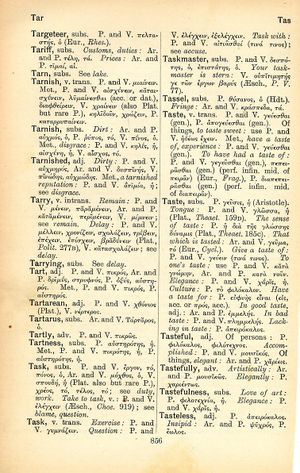taste
Γυνὴ τὸ σύνολόν ἐστι δαπανηρὸν φύσει → Natura fecit sumptuosas feminas → Es ist die Frau durchaus kostspielig von Natur
English > Greek (Woodhouse)
verb transitive
P. and V. γεύεσθαι (gen.), P. ἀπογεύεσθαι (gen.).
of things, to taste sweet: use P. and V. ἡδέως ἔχειν.
Met., have a taste of, experience: P. and V. γεύεσθαι (gen.).
to have had a taste of: P. and V. γεγεῦσθαι (gen.), πεπειρᾶσθαι (gen.) (perf. infin. mid. of πειρᾶν) (Eur., Fragment), P. διαπεπειρᾶσθαι (gen.) (perf. infin. mid. of διαπειρᾶν).
substantive
tongue: P. and V. γλῶσσα, ἡ (Plato, Theaetetus 159D).
the sense of taste: P. ἡ διὰ τῆς γλώσσης δύναμις (Plato, Theaetetus 185C).
that which is tasted: Ar. and V. γεῦμα, τό (Eur., Cyclops).
give taste of: P. and V. γεύειν (τινά τινος).
to one's taste: use P. and V. κατὰ γνώμην, Ar. and P. κατὰ νοῦν.
have a taste for: P. εὐφυής εἶναι (εἰς, acc. or πρός, acc.).
in good taste, adj.: Ar. and P. ἐμμελής.
in bad taste: P. and V. πλημμελής.

